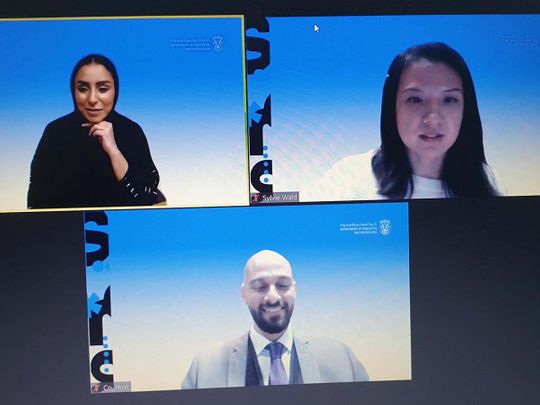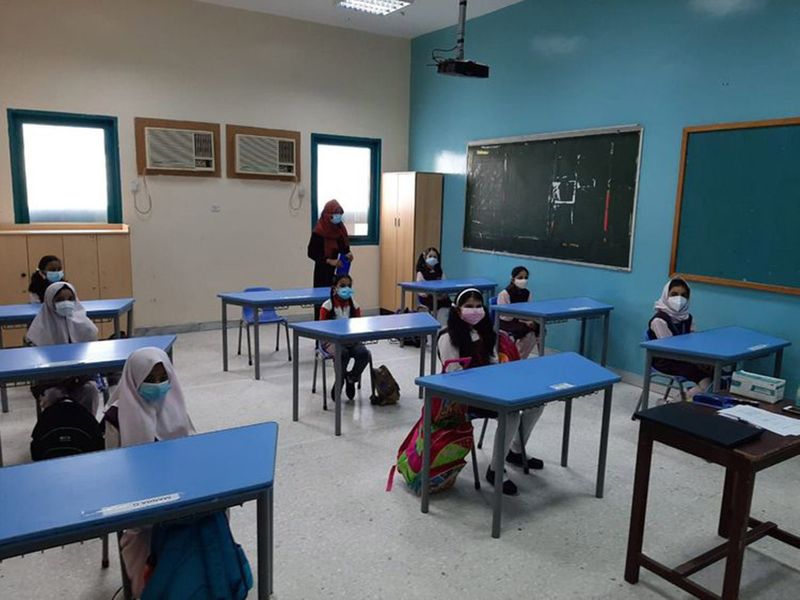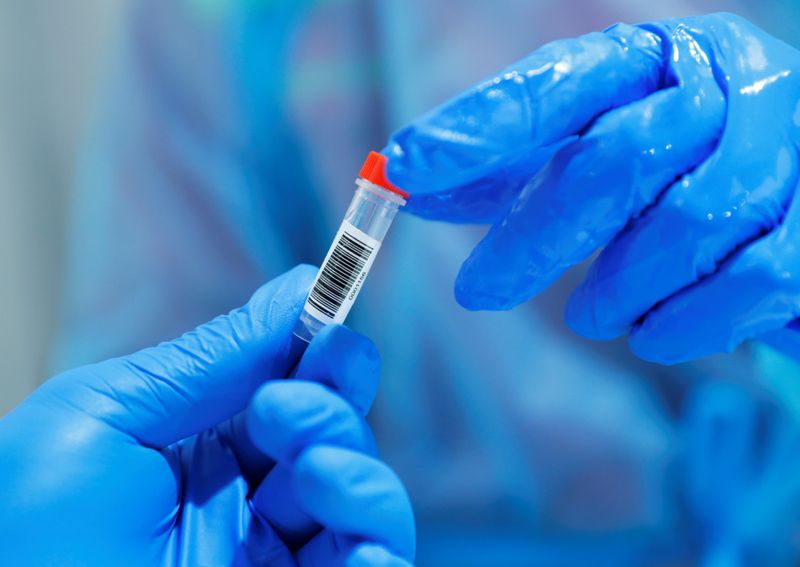
Abu Dhabi: Starting Tuesday (September 7, 2021), Abu Dhabi students will be able to undergo saliva and nasal COVID-19 PCR tests in their schools.
The Abu Dhabi Department of Education and Knowledge (Adek), which regulates over 200 private and chartered schools in the emirate, has taken the initiative in collaboration with the Department of Health, in order to support education continuity and alleviate pressure on parents.
The school visits will enable them to meet routine testing requirements and also to quickly screen those with COVID-19 symptoms.
In a webinar for parents following the start of the new term, Adek officials had addressessed the need for more convenient PCR testing options.
“We saw that there was quite a bit of congestion at the PCR testing centres before the start of the school term. We are currently working with the health authorities to organise for service providers to visit every school at a certain frequency so that children can get their PCR testing done in school,” Ayesha Al Blooshi, COVID-19 incident management team lead at Adek, told parents on Wednesday evening
“We are finalising the details, so the testing can be done at a specific location like the gym or the nurse’s clinic or [testing personnel] will go from class to class to get the tests done,” Al Blooshi said.New term
Schoolchildren across the UAE this week resumed classes after the summer break. Ahead of the start of the term, the National Crisis, Emergencies and Disasters Management Authority (NCEMA) had announced mandatory PCR tests for all children physically returning to school.
PCR testing regulation
The regulations called for all children to present a negative PCR test result with 96-hour validity before physically returning to classrooms for the first time this term. Thereafter, students have to undergo PCR testing every 14 days for the first month of schooling.
Beyond this, children need to test every month if they are aged less than 12 years, or if they are at least 12 years and vaccinated against COVID-19. Children who are at least 12 years old but have not yet been fully vaccinated must take a PCR test every week.
Free of charge
In Abu Dhabi, the tests are being administered free of charge, in collaboration with Adek, across public and private testing centres. However, as reported by Gulf News, centres still saw a huge rush of families queueing up for the tests during the weekend before the new term started — especially ones that offered saliva testing for children aged less than 12 years.
Screening schoolchildren
Explaining why all schoolchildren need to be regularly screened via PCR, Al Blooshi said it helps safeguard the community against COVID-19 outbreaks.
“For us, it’s been a balance between a return to normality in the school system and keeping the kids safe. This year, we are allowing a lot more children to attend school physically and we have found that this proactive approach of PCR testing really works for us. It has allowed us to keep positive cases outside the school system, especially with new [COVID-19] variants of concern,” she explained.
Testing after holidays
Children will also have to present negative PCR tests with 96-hour validity after major school vacations and public holidays, as mandated by Adek. Officials said this approach has been chosen based on COVID-19 case tracking and analyses conducted in previous terms.

“Based on our analyses of the number of cases reported by schools after specific long or public holidays, we noticed that there were spikes, particularly after the end of these breaks. So having a 96-hour PCR test validity before returning to school safeguards the school community, preventing positive cases from entering the school and spreading the virus among students and teachers. This requirement, therefore, helps ensure a healthy and safe environment at schools,” an Adek official explained.
Students do not need to show their Al Hosn app on their phones to verify PCR test status. Instead, they can present a printout of the result to the school.
Vaccination rates
Vaccination rates among schoolchildren in Abu Dhabi currently stand at 84 per cent among children aged 16 years and older, 52 per cent among students aged 12 to 15 years, and 12 per cent among children aged less than 12, Al Blooshi said. On the other hand, every member of school staff who is physically attending schools has been fully vaccinated.
Over the summer, NCEMA had mandated that all children aged 16 years and older who wish to receive in-class instruction must be fully vaccinated or have a medical exemption. Those who do not get the vaccine shots will have to continue distance learning.
“However, we have made arrangements for children aged at least 16 years who choose not to vaccinate to attend high-stakes exams,” Al Blooshi said.
Reopening model
This term, only 26 private schools in Abu Dhabi will not offer distance learning as a full-time option, yet even these institutions need to provide distance learning for children who are 16 years or older and not vaccinated and for children who cannot physically attend schools due to medical reasons. They also need to ensure that classes can switch to distance learning in case of a spike in COVID-19 cases.
Al Blooshi also reassured parents that schools would remain safe environments for children despite the pandemic. All private and chartered schools have had to meet health and safety regulations before being allowed to reopen and regular compliance checks will be conducted through the term. There are also hefty penalties for schools that fail to adhere to the safety standards and protocols, ranging from warnings to fines of up to Dh250,000 for complete negligence.

Key facts regarding reopening of schools:
-Physical distancing requirement reduced from 1.5 metres between individuals to one metre. This helped increase school capacity from 30 per cent over the last term to 70 per cent this time around.
-Resumption of physical education classes, live cooking, canteen services, prayer rooms.
-Bus capacity increased from 60 per cent in last term to 75 per cent.
-100 per cent of staff attending school physically are vaccinated against COVID-19, compared to 90 per cent last term.
-84 per cent of students aged 16 years and older are fully vaccinated against COVID-19. 52 per cent of students aged 12-15 years are vaccination. Also, 12 per cent of children aged less than 12 are vaccinated.
-School staff and students grouped into macrobubbles of individuals who practise physical distancing and do not mingle with other microbubble. Only children up to Grade 2 can be grouped in bubbles where there is no need for physical distancing.
-Children aged 16 years and above must be fully vaccinated to attend classes in school or must opt for distance learning. Arrangements are also in place for those doing distance learning to attend high-stakes exams in school.
-Vaccine boosters required six months after completing second dose of one vaccine.
Read more
- Dubai surgeon removes largest-ever gallstone in UAE through keyhole surgery on woman
- Aster Volunteers donate 75 tonnes of relief goods to 1500 underprivileged families in Yemen
- Dubai: DHA to administer third dose of the Pfizer-BioNTech COVID-19 vaccine for certain categories
- Watch: Indian mission sends expat heart patient home for free after Aster waives off massive hospital bill
-NCEMA PCR testing requirements apply to children attending school in person: 96-hour valid negative test after major holidays, testing every 14 days for the first month. Thereafter, test every month for children aged less than 12, and those who are 12 or more but vaccinated. Unvaccinated students aged at least 12 years must test every week. Saliva tests accepted for children less than 12, nasopharyngeal swab PCR test for older children.
-Fewer shifts to distance learning expected for students physically attending school.
-Live tracking of COVID-19 cases and contacts in school and identification of COVID-19 hotspots for proactive responses, including shifts to distance learning if required.
-Schools to meet health and safety criteria before being allowed to reopen and submit daily compliance self-checks. Also routine compliance visits by Adek through the term.
-Penalty for noncompliant schools includes warnings, and fines ranging from Dh10,000 to Dh250,000.
-Green Pass system applies to all parents who wish to visit schools, and PCR tests must have 96-hour validity.





